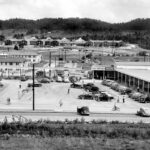
The site plan for the redevelopment of the Oak Ridge Mall shows a multi-use, town center development with retail, office, hotel, and residential properties. (Submitted image)
The two state approvals required for the $13 million tax financing agreement for the proposed redevelopment of the Oak Ridge Mall have now been granted.
Tennessee Comptroller Justin P. Wilson notified mall redevelopment representatives of his approval in a Feb. 5 letter.
Earlier, in January, the Tennessee Department of Economic and Community Development notified project representatives that it had approved the proposed tax increment financing, or TIF, but would not issue a separate letter.
Under Tennessee law, the comptroller and ECD both had to approve the TIF after considering whether its use is in the state’s best interest. The comptroller said it was in the Feb. 5 letter.
ECD approval was granted in a different manner. In a January e-mail, ECD General Counsel Sharon Kolb said the department had received the request for a “best interest” determination for the Oak Ridge Mall on Dec. 19. Since the department did not approve or deny the request within 30 days, it was deemed approved under the Tax Increment Financing Act, Kolb said.
“The use is deemed approved, and no separate letter will be sent,” Kolb said.
The comptroller received the “best interest” request on Jan. 6 and also had 30 days to respond. That deadline was last week, when Wilson announced his approval in a letter to Nashville law firm Bradley, Arant, Boult, and Cummings, which is working with Crosland Southeast, the North Carolina company that wants to redevelop the mostly empty mall.
The two state approvals are the last public approvals needed for the TIF. The use of the 20-year tax increment financing has also been endorsed by the Oak Ridge Industrial Development Board and approved by the Oak Ridge City Council and Anderson County Commission.
The tax increment financing would use new property tax revenues generated at the 59-acre site to help pay for development costs, possibly including tearing down the existing space between the two remaining anchor stores, JCPenney and Belk, as well as for replacing aging infrastructure and building new roads.
The redeveloped mall could open in 2016. The current enclosed mall would be converted into an open-air, retail-driven, mixed-use property that could include 400,000 square feet of retail space and roughly 60,000 to 100,000 square feet of office space, a hotel of about 100 to 120 rooms, and up to 50 multi-family, “walkable” residential units. It could also include three to four restaurants.
Crosland Southeast, which is working on a total of three “dead mall” projects, could close on the purchase in the third quarter of 2014, and construction could last about 18 months. The company has had a purchase contract on the mall since January 2013.









Leave a Reply